Key takeaways:
- Thoroughly review venue contracts to avoid hidden fees and unexpected costs, especially regarding cancellation policies and service inclusions.
- Establish good rapport with venue managers to negotiate better terms and build relationships for future events.
- Prioritize clear communication and flexibility in negotiations to reveal alternative options and achieve favorable agreements.
- Document all agreements in writing to prevent misunderstandings and secure verbal promises made during negotiations.
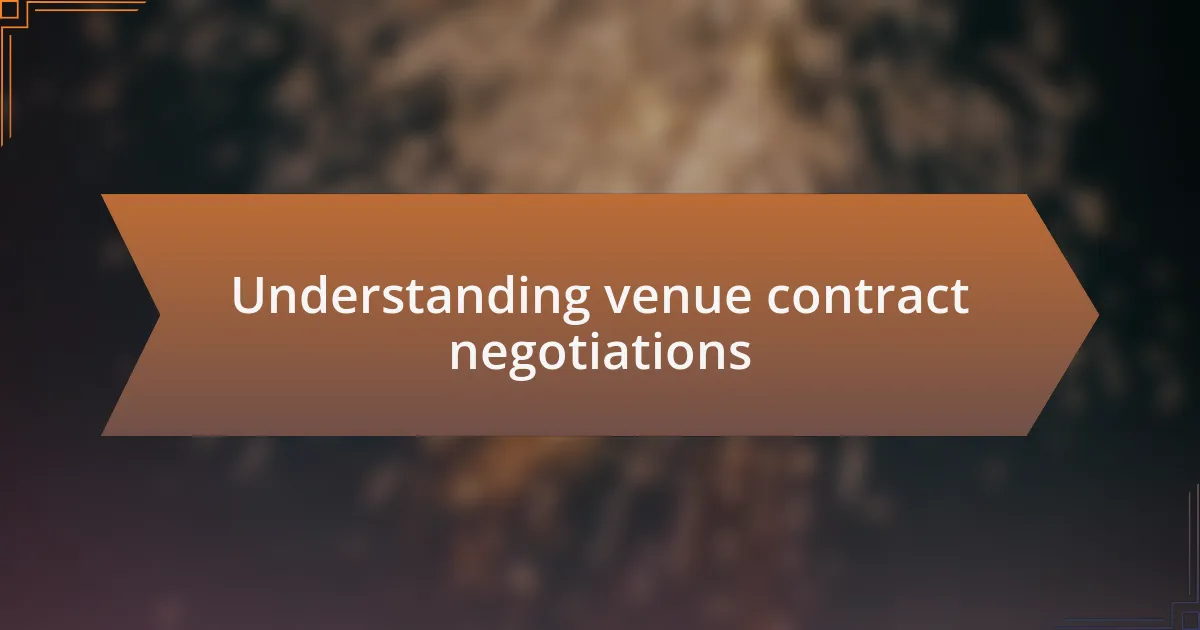
Understanding venue contract negotiations
When delving into venue contract negotiations, it’s essential to understand the fine print. I remember a negotiation where a seemingly minor clause about cancellation policy ended up costing us significantly. Have you ever felt like you were navigating a maze with no clear exit? That’s often how these discussions can feel if you’re not thoroughly prepared.
One key aspect to consider is the scope of services included in the contract. I once encountered a venue that boasted a range of services, but as we dug deeper, we realized many were optional at an additional cost. This experience taught me the importance of clarity—always ask for detailed breakdowns. Are you willing to risk unexpected charges? I certainly wasn’t.
It’s also crucial to build rapport with venue managers during negotiations. I once developed a friendly relationship with a manager, which opened doors for better deals and more flexible terms. Have you ever thought about how personal connections can influence negotiations? I firmly believe that cultivating these relationships can lead to more favorable outcomes not only for the current event but for future collaborations.
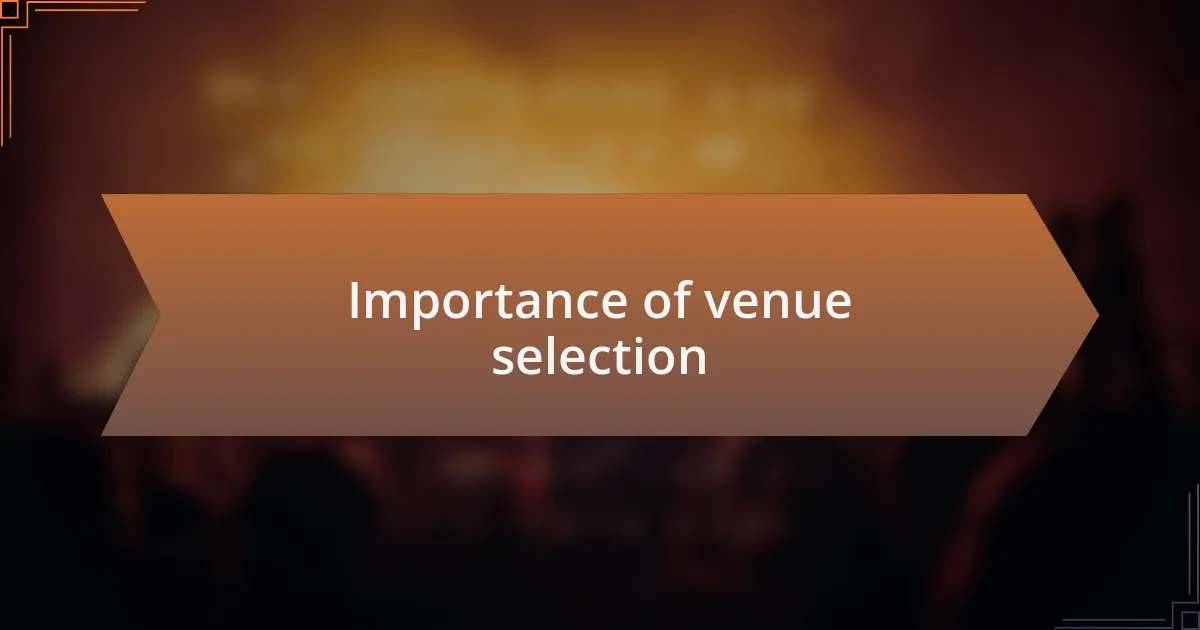
Importance of venue selection
Selecting the right venue can significantly affect the success of any event. I remember a corporate gathering where we chose a trendy space that looked great in pictures but was utterly unsuitable for our needs. The cramped layout not only made it difficult for attendees to interact but also impacted the overall atmosphere. Have you ever walked into a space that just felt wrong? That’s the power of venue selection.
It’s not just about aesthetics; the location also plays a vital role. I once organized a charity event in a venue that was far from public transport, and attendance suffered as a result. The convenience of a central location can boost participation and create a more enjoyable experience for all. So, how much thought are you putting into your venue’s accessibility? Trust me, it makes a world of difference.
The ambiance and setting must align with the event’s theme. I will never forget a wedding I attended in a stark, modern venue when the couple envisioned a cozy, vintage atmosphere. Guests felt disconnected from the theme, which diminished the emotional impact of the celebration. Isn’t it essential for the venue to reflect the event’s purpose? In my experience, choosing a venue that resonates with your theme is a game-changer for creating memorable experiences.
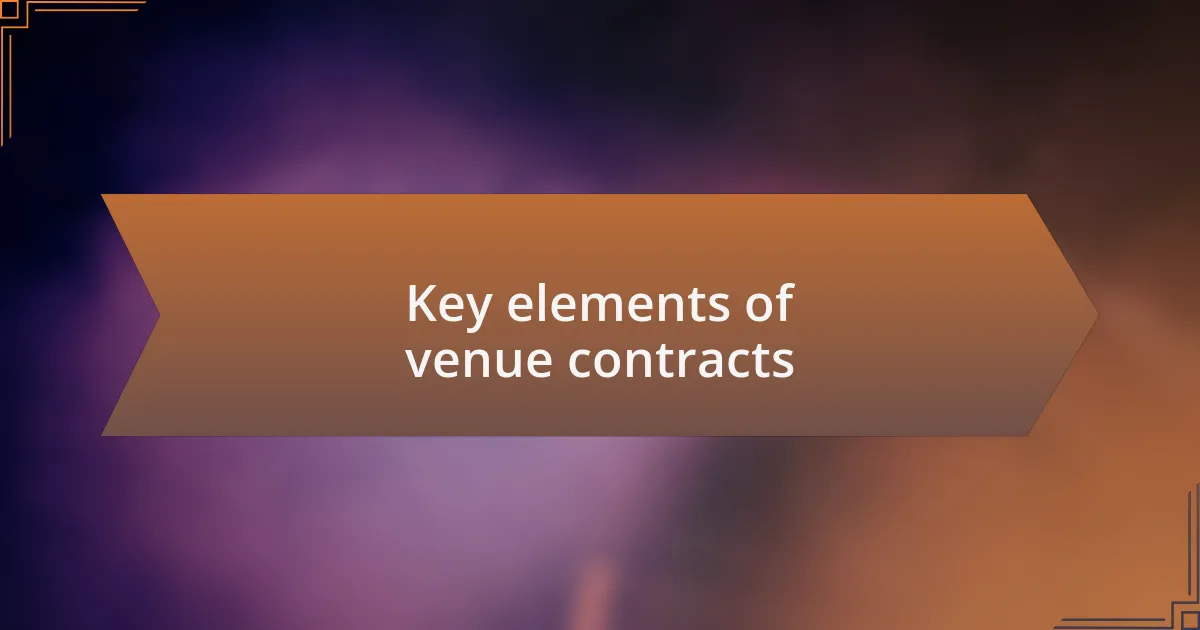
Key elements of venue contracts
When delving into venue contracts, there are several key elements that you simply can’t overlook. One crucial factor is the pricing structure, which often includes rental fees, deposits, and potential hidden costs. I vividly recall a situation where I missed a hidden fee for cleanup services in a contract; it added a surprise expense that strained our budget. Have you ever faced unexpected costs that could have easily been avoided? Understanding these financial elements is vital to prevent unpleasant surprises down the line.
Another essential component is the flexibility of the venue regarding adjustments or changes. In a past event, our team had to modify the guest count closer to the date, and the venue’s willingness to accommodate these changes made a significant difference. What’s your experience with last-minute adjustments? A contract that clearly states the policy on changes can save you a lot of stress as the event unfolds.
Finally, liability clauses are critical in any venue contract. I learned this the hard way when planning an outdoor festival; the venue had specific restrictions on weather-related cancellations. I found myself caught between hope and worry as storm clouds loomed overhead. Have you ever considered how unforeseen circumstances can impact your event? Ensuring that the contract includes clear terms about liability can provide peace of mind and protect you from unexpected outcomes.
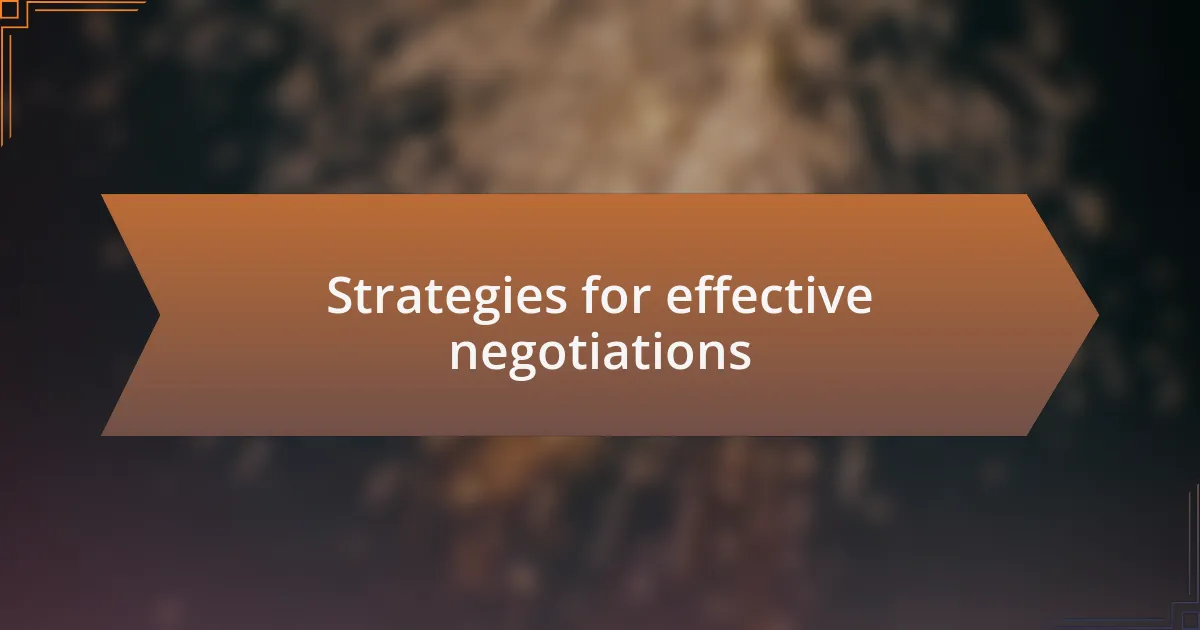
Strategies for effective negotiations
Effective negotiation strategies can make a significant difference when working on venue contracts. One approach that I’ve found helpful is to enter the discussion with clear priorities in mind. For instance, during a recent negotiation, I knew that securing a favorable cancellation policy was essential for my team due to the uncertain circumstances surrounding our event. What are your must-haves in negotiations? By prioritizing, you can steer conversations towards what truly matters to you.
It’s also crucial to foster a collaborative atmosphere. In my experience, building rapport with venue managers has opened doors to more flexible terms. There was a time when I casually shared my excitement about an upcoming event with a venue representative, which led them to offer additional perks, like an extended setup time. Have you ever had similar exchanges that changed the course of a negotiation? A little connection can go a long way in creating a mutually beneficial agreement.
Lastly, don’t underestimate the power of asking questions. In my early days, I hesitated to inquire about certain terms, thinking they were set in stone. However, I learned that open dialogue can reveal alternatives or solutions I hadn’t considered. In one negotiation, I asked about potential early access to the venue, which turned into a significant advantage for our setup process. What questions have you found powerful in your negotiations? Always remember that your inquiries can lead to unexpected discoveries and help you craft a better deal.
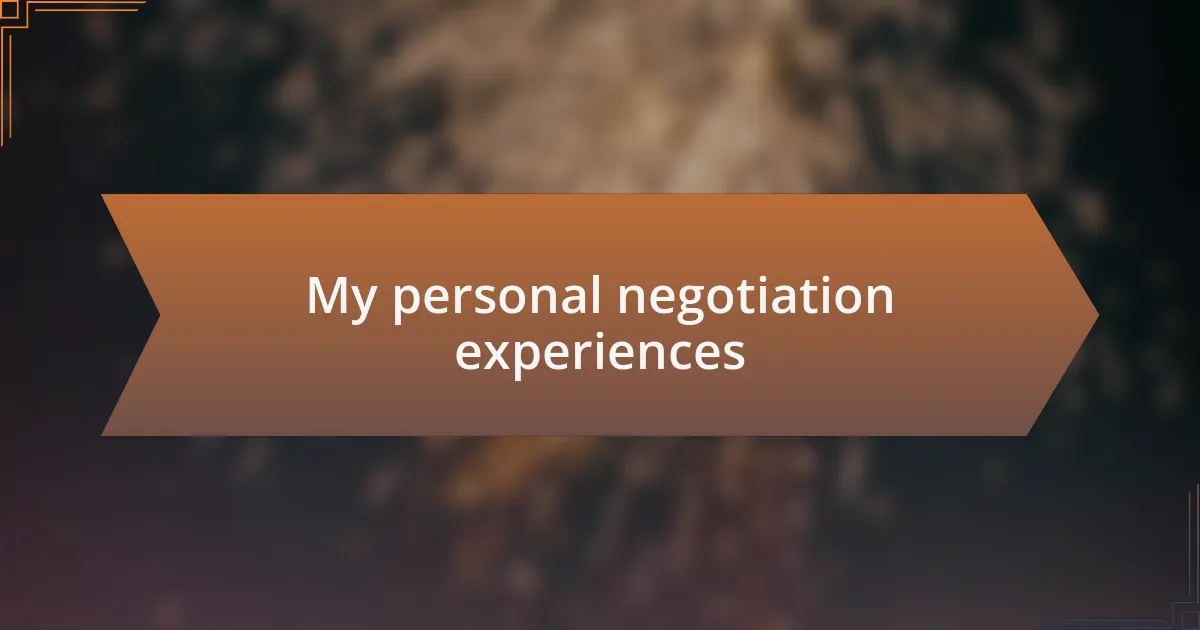
My personal negotiation experiences
I remember negotiating the contract for a large conference in my city not too long ago. The venue had great facilities, but the initial terms were steep, and I felt a knot in my stomach as I anticipated the back-and-forth process. I took a deep breath and expressed my concerns openly, which surprisingly led the venue manager to reassess their pricing. Have you ever experienced a moment when speaking up turned the tide in your favor?
There was another occasion where I needed to secure additional audio-visual equipment without incurring extra charges. I approached the conversation with a genuine curiosity about their capabilities. To my surprise, the representative revealed some hidden deals they had not initially presented. I couldn’t help but wonder: how often do we overlook untapped resources simply because we hesitate to ask?
One memorable negotiation involved a last-minute change to an event date due to unforeseen circumstances. I felt overwhelmed at first, worrying about penalties and lost deposits. But by reaching out and explaining our situation transparently, the venue agreed to accommodate the change without additional fees. This taught me that vulnerability and honesty can create opportunities. Have you found that openness fosters better relationships in negotiations?
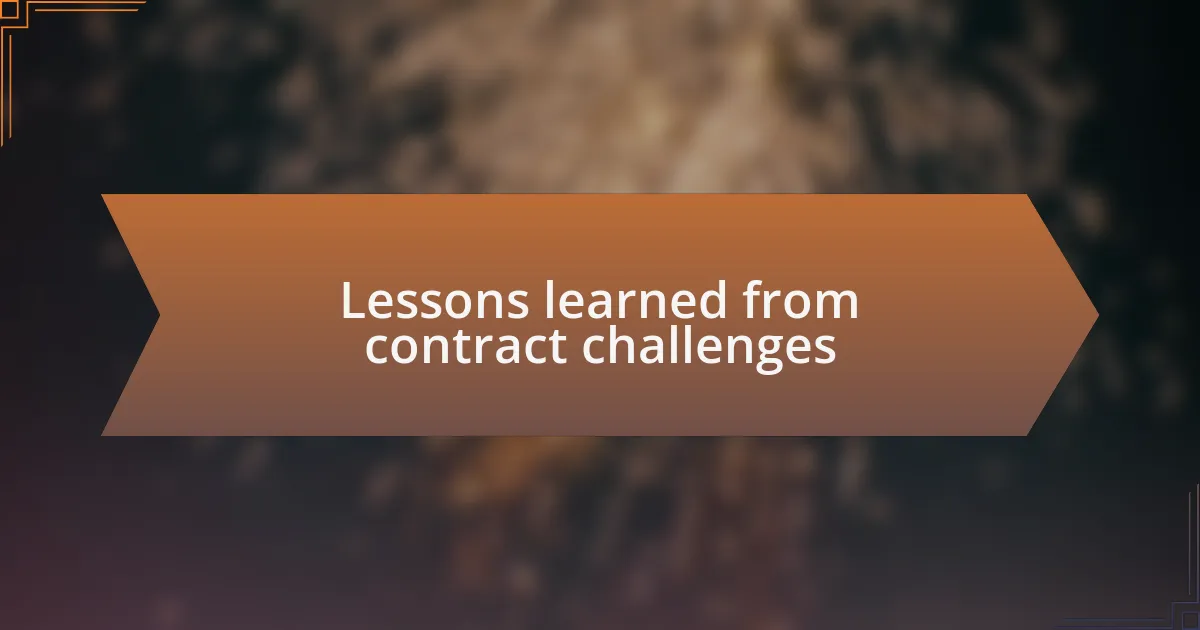
Lessons learned from contract challenges
Navigating contract challenges can be a real teacher. I recall a time when I didn’t thoroughly read the fine print. As a result, I was blindsided by unexpected fees related to catering services. It was a painfully frustrating moment that made me realize the importance of diligence in negotiations. Have you ever overlooked details that came back to haunt you?
Another key takeaway emerged from a negotiation where I felt pressured to accept terms that didn’t quite fit my vision. By asserting what was critical to my event, I discovered that some elements were more flexible than I initially believed. This experience underscored the lesson that it’s okay to be assertive. How often do we shy away from pushing for what we truly want?
Finally, I learned the hard way that timing can significantly impact negotiations. During one contract discussion, I rushed my decision due to an impending deadline. In retrospect, I understand that taking the time to evaluate offers and ask questions could have yielded a better deal. It’s curious how often we prioritize speed over thoughtful consideration, isn’t it?
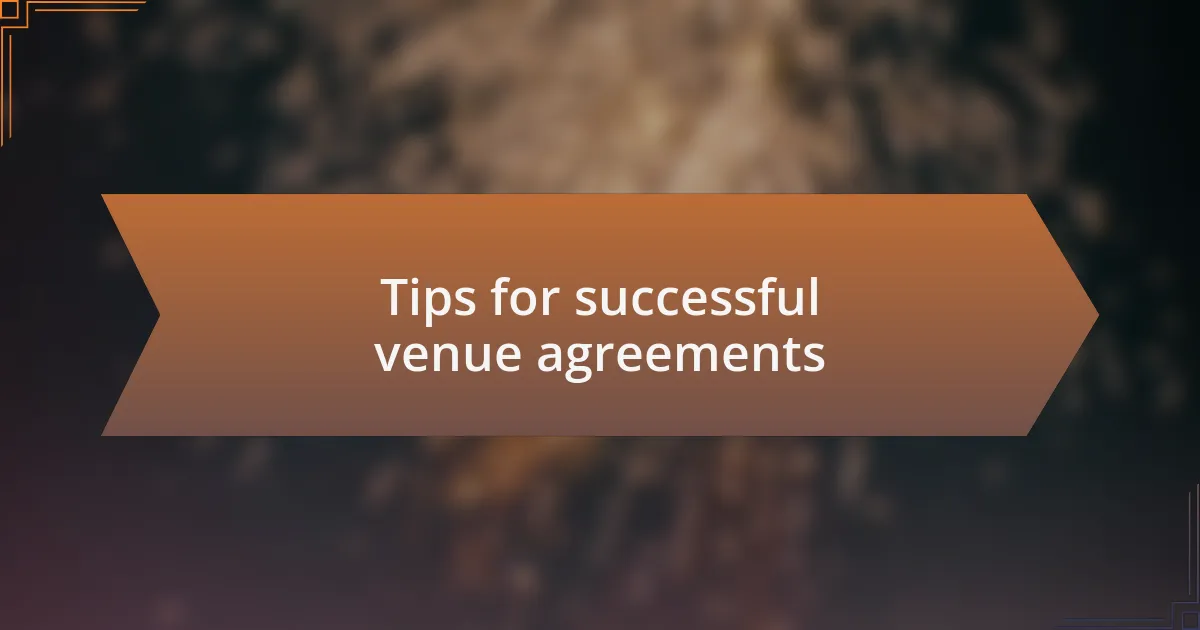
Tips for successful venue agreements
When it comes to securing a favorable venue agreement, one crucial tip is to establish clear communication from the outset. I once entered negotiations excited about a venue’s potential, only to discover later that the event manager had misinterpreted some of my requests. How frustrating it was to deal with misunderstandings that could have been easily addressed with open dialogue! Establishing a direct line of communication can clarify expectations and save time.
Another essential aspect is to consider your flexibility on certain terms. I distinctly recall a situation where I held firm on specific dates, thinking they were non-negotiable. However, once I opened the door to discuss alternatives, I found a fantastic venue that had additional availability and perks I hadn’t anticipated. How often do we box ourselves in by not exploring options? It’s a reminder that flexibility can lead to unexpected opportunities.
Lastly, always make sure to secure everything in writing, especially verbal promises. There was an instance when a venue coordinator assured me of discounted parking rates verbally, but when I arrived, those rates weren’t honored. This experience was a really important wake-up call. Why leave room for ambiguity when you can fortify agreements on paper? Documenting every detail not only safeguards your interests but also builds trust with the venue.